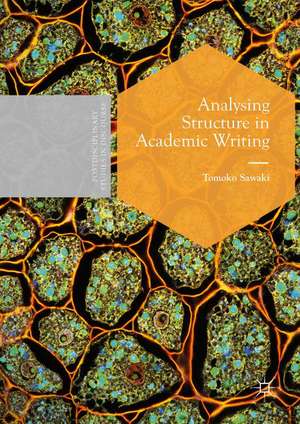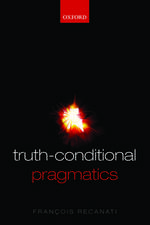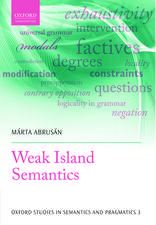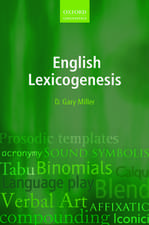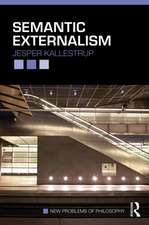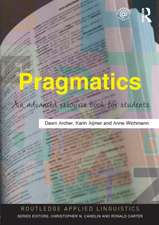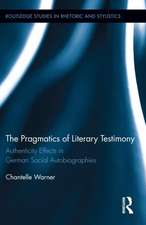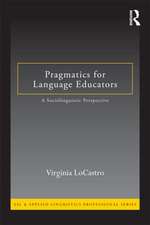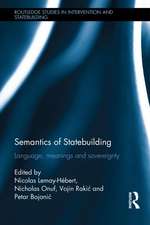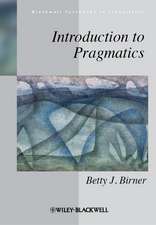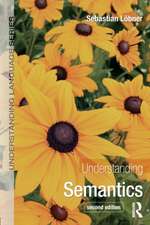Analysing Structure in Academic Writing: Postdisciplinary Studies in Discourse
Autor Tomoko Sawakien Limba Engleză Hardback – 17 oct 2016
Din seria Postdisciplinary Studies in Discourse
- 18%
 Preț: 723.06 lei
Preț: 723.06 lei - 18%
 Preț: 726.37 lei
Preț: 726.37 lei -
 Preț: 484.85 lei
Preț: 484.85 lei - 18%
 Preț: 885.95 lei
Preț: 885.95 lei - 15%
 Preț: 694.87 lei
Preț: 694.87 lei - 15%
 Preț: 639.90 lei
Preț: 639.90 lei - 15%
 Preț: 643.34 lei
Preț: 643.34 lei -
 Preț: 385.62 lei
Preț: 385.62 lei -
 Preț: 210.55 lei
Preț: 210.55 lei - 18%
 Preț: 942.44 lei
Preț: 942.44 lei - 15%
 Preț: 648.56 lei
Preț: 648.56 lei -
 Preț: 447.41 lei
Preț: 447.41 lei - 18%
 Preț: 952.89 lei
Preț: 952.89 lei - 18%
 Preț: 724.17 lei
Preț: 724.17 lei - 15%
 Preț: 649.06 lei
Preț: 649.06 lei -
 Preț: 419.21 lei
Preț: 419.21 lei -
 Preț: 385.08 lei
Preț: 385.08 lei - 15%
 Preț: 698.80 lei
Preț: 698.80 lei - 18%
 Preț: 734.59 lei
Preț: 734.59 lei -
 Preț: 382.18 lei
Preț: 382.18 lei - 15%
 Preț: 691.59 lei
Preț: 691.59 lei - 18%
 Preț: 740.74 lei
Preț: 740.74 lei - 15%
 Preț: 699.28 lei
Preț: 699.28 lei - 15%
 Preț: 644.63 lei
Preț: 644.63 lei - 18%
 Preț: 1011.45 lei
Preț: 1011.45 lei - 18%
 Preț: 954.62 lei
Preț: 954.62 lei -
 Preț: 438.87 lei
Preț: 438.87 lei -
 Preț: 318.82 lei
Preț: 318.82 lei -
 Preț: 222.84 lei
Preț: 222.84 lei - 15%
 Preț: 590.95 lei
Preț: 590.95 lei
Preț: 642.68 lei
Preț vechi: 756.09 lei
-15% Nou
Puncte Express: 964
Preț estimativ în valută:
122.97€ • 128.74$ • 101.75£
122.97€ • 128.74$ • 101.75£
Carte tipărită la comandă
Livrare economică 05-19 aprilie
Preluare comenzi: 021 569.72.76
Specificații
ISBN-13: 9781137542380
ISBN-10: 1137542381
Pagini: 224
Ilustrații: XIX, 275 p. 17 illus., 4 illus. in color.
Dimensiuni: 148 x 210 x 22 mm
Greutate: 0.48 kg
Ediția:1st ed. 2016
Editura: Palgrave Macmillan UK
Colecția Palgrave Macmillan
Seria Postdisciplinary Studies in Discourse
Locul publicării:London, United Kingdom
ISBN-10: 1137542381
Pagini: 224
Ilustrații: XIX, 275 p. 17 illus., 4 illus. in color.
Dimensiuni: 148 x 210 x 22 mm
Greutate: 0.48 kg
Ediția:1st ed. 2016
Editura: Palgrave Macmillan UK
Colecția Palgrave Macmillan
Seria Postdisciplinary Studies in Discourse
Locul publicării:London, United Kingdom
Cuprins
Chapter 1: Introduction.- Chapter 2: Prototype Theory and Genre Analysis.- Chapter 3: Revisiting Structuralism.- Chapter 4: The Binary Model.- Chapter 5: Conceptualisation of Generic Structure Components.- Chapter 6: Diversity in Academic Writing.- Chapter 7: Identifying Generic Structure Components.- Chapter 8: In the Midst of Globalisation in Academic Writing.- Chapter 9: Conclusion.
Notă biografică
Tomoko Sawaki is an independent researcher and holds a Ph.D. from the University of New South Wales, Australia. Her research interests include English for Academic Purposes, genre analysis, semiotics, cognitive linguistics, and corpus linguistics. Her research has been published in such journals as Journal of English for Academic Purposes and English Text Construction.
Textul de pe ultima copertă
This book breaks through formalistic traditions to propose a new generic structure analytical framework for academic writing. The integrated approach, taking lessons from cognitive linguistics and structuralism, offers a foundation for establishing research and pedagogy that can promote diversity and inclusion in academia. The simplicity of the flexible structure analytical model proposed by Sawaki enables the user to analyse diverse instances of genre. Further innovation is made in the analysis of generic structure components by integrating George Lakoff and Mark Johnson’s metaphor analysis method, so that the model can account for cultural and ideological patterns that structure our abstract thinking. Using these integrations, the author has established a structure analytical model that can take into account linguistic, cognitive, and pragmatic aspects of genre. Researchers in the fields of linguistics, discourse studies, cultural studies, education, and English for Academic Purposeswill be able to use this model to identify whether an atypical instance in academic texts is a result of the writer’s individual failure or a failure to understand diversity in academic writing.
Caracteristici
Establishes a new model for analysis of the basic structure shared across different types of academic writing, regardless of the influence of diverse ideologies Argues that disciplinary constraints alienate marginal individuals from academic activities Increases awareness that different conceptualisations of academic writing are not necessarily superior or inferior
